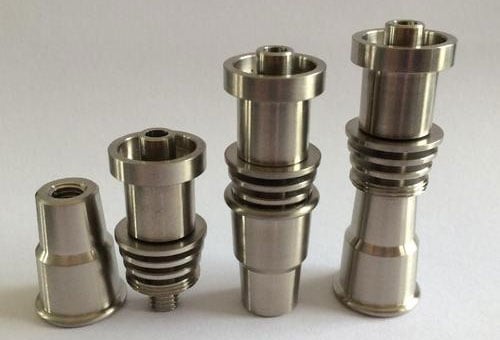Custom Titanium CNC Machining Services – Precision Titanium Parts China Manufacturer
Junying (CNClathing.com) is a CNC machining titanium China company specialized in custom titanium parts manufacturing for more than 10 years, with advanced in-house equipment and tool facility, proficient machinists, and rich expertise, we can provide precision titanium machining services and customize quality titanium CNC machining parts with exact specification, budget prices and on-time delivery based on your requirements. In our titanium CNC machining shop, milling, turning, drilling and more processes are available, as well as excellent surface finishing. Our lineup of titanium and titanium alloy components can be used in broad range of industries and applications, typically including airplane parts and fasteners, gas turbine engines, compressor blades, casings, engine cowlings and heat shields. We are aiming to establish close and friendly cooperation with worldwide customers.
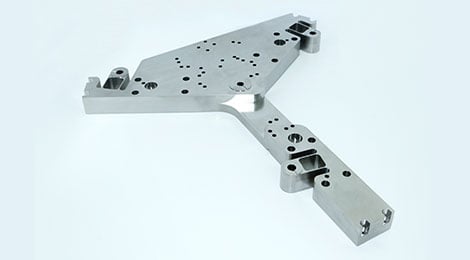
Product Specifications of Junying Titanium CNC Machining
- Machining Titanium Grades: grade 5 (Ti 6Al-4V), grade 2, grade 7, grade 23 (Ti 6Al-4V Eli), etc.
- Product Types: rings, earrings, fasteners, cases, vessels, hubs, custom components, etc.
- CNC Machining Processes: titanium milling, titanium turning, titanium drilling, etc.
- Applications: aerospace, surgical & dental equipment, oil/gas exploration, fluid filtration , military, etc.
Why Choose Junying Titanium CNC Machining Services
- Save time and money for your titanium project but quality guaranteed.
- High productivity, outstanding efficiency and high accuracy
- A wide range of titanium grades and alloy materials can be machined
- Custom complex titanium machined parts and components at specific tolerances
- High speed machining for prototyping and low to high volume production runs
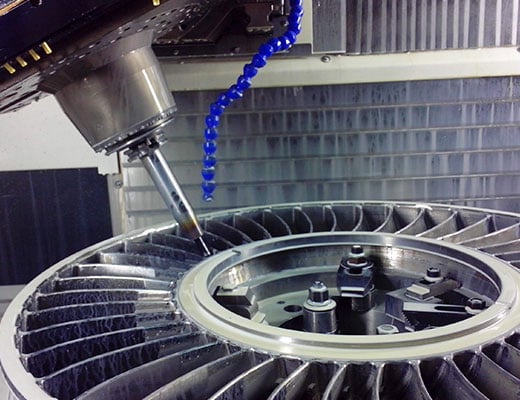
Titanium Grades and Alloys for CNC Machining
| Grade | Properties | Applications |
|---|---|---|
| Grade 1 (CP Titanium) | Softest grade, highest ductility, excellent corrosion resistance, good cold-forming characteristics. | Architecture, automotive, desalination, medical, marine industries. |
| Grade 2 (CP Titanium) | Moderate strength, excellent weldability, good resistance to oxidation and corrosion. | Aerospace, chemical processing, marine applications. |
| Grade 3 (CP Titanium) | Stronger than Grades 1 and 2, excellent corrosion resistance. | Aerospace and industrial applications require moderate strength. |
| Grade 4 (CP Titanium) | Higher strength than Grades 2 and 3, good corrosion resistance. | Aerospace, chemical processing, medical applications. |
| Grade 5 (Ti-6Al-4V) | High strength and toughness, good weldability, most commonly used titanium alloy. | Aerospace, chemical processing, marine, and medical fields. |
| Grade 6 (Ti-5Al-2.5Sn) | High strength, excellent stability, good weldability, performs well at elevated temperatures. | Aerospace components (airframes, jet engines), high-temperature parts. |
| Grade 7 (Ti-0.15Pd) | Similar to Grade 2 with enhanced corrosion resistance, especially in reducing acids. | Chemical processing, desalination. |
| Grade 11 (Ti-0.15Pd) | High corrosion resistance, similar to Grade 2. | Chemical processing, power generation. |
| Grade 12 (Ti-0.3Mo-0.8Ni) | Enhanced corrosion resistance compared to Grades 2 and 3. | Chemical processing, desalination, power generation. |
| Grade 23 (Ti-6Al-4V ELI) | Lower oxygen, nitrogen, and iron content than Grade 5, better ductility and fracture toughness. | Aerospace, medical, chemical processing. |
Titanium Milling: This process uses rotating cutting tools to remove material from the titanium workpiece. It is effective for creating complex shapes and features. Due to titanium’s strength and low thermal conductivity, careful management of cutting speeds and coolant levels is essential to prevent tool wear and overheating.
Titanium Turning and Lathing: In this process, the titanium workpiece is rotated while a stationary cutting tool shapes it. This method is ideal for producing cylindrical parts. However, it requires careful handling to avoid excessive vibrations and ensure a smooth finish.
Titanium Drilling and Boring: Drilling creates precise holes in titanium using sharp bits while boring enlarges these holes to meet tight tolerances. Both processes are crucial for applications requiring accurate hole dimensions.
5-Axis Titanium Machining: This advanced process allows the titanium workpiece to move along five different axes, enabling the creation of intricate parts with fewer setups. It is particularly useful in industries such as aerospace and medicine, where precision is critical.
Titanium Electrical Discharge Machining (EDM): While not as commonly mentioned, EDM can also be used for titanium. This process involves using electrical discharges to remove material, making it suitable for intricate designs and hard-to-machine materials like titanium.
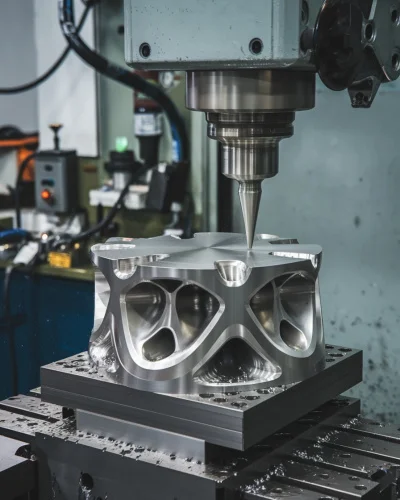
CNC Machined Titanium Parts Examples and Applications
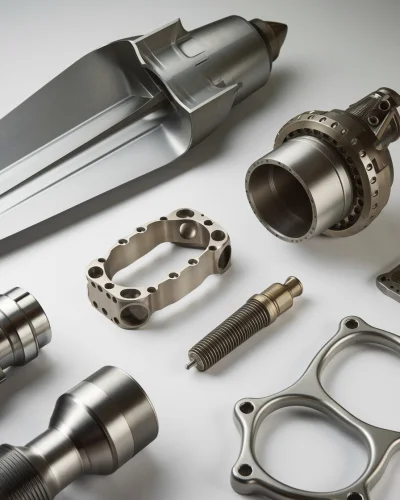
Aerospace Industry: lightweight, high-strength components such as jet engine blades, landing gear, and structural airframe components for aircraft like the Boeing 787.
Medical Devices: biocompatible surgical implants like hip and knee replacements, as well as dental implants and surgical tools.
Automotive Sector: such as Formula 1 cars, use CNC machined titanium parts for engine components, exhaust systems, and suspension parts.
Marine Applications: corrosion-resistant components like propeller shafts, underwater housings, and fasteners for submarines and ships.
Defense Industry: lightweight armor plating, missile components, and military aircraft parts.
Sports Equipment: premium sports gear, such as golf club heads, bicycle frames, and tennis rackets.
Chemical Processing: heat exchangers, valves, and pumps used in corrosive chemical processing environments.
Energy Sector: used in turbine blades, offshore drilling equipment, and components for nuclear reactors.
Surface Finishing Services for Titanium Parts
Polishing: a mechanical finishing process that uses abrasives or chemical agents to create a high-gloss, mirror-like finish, improving corrosion resistance, cleanliness, and visual appeal.
Anodizing: creates a protective oxide layer on the titanium surface through an electrochemical process, increasing corrosion resistance, enhancing durability, and allowing for various color options.
Bead Blasting: propels small glass beads at high speed to produce a matte or satin finish, effectively removing tool marks and imperfections for a smoother appearance.
Powder Coating: involves electrostatically applying a dry powder to the titanium surface and curing it in an oven, resulting in a tough, uniform layer that enhances corrosion resistance, impact strength, and decorative appeal.
Electropolishing: smooths and brightens the titanium surface by chemically removing a thin layer of material, improving corrosion resistance and achieving a clean, sterile finish for medical and food processing applications.
Passivation: is a chemical treatment that enhances corrosion resistance by removing free iron and contaminants from the titanium surface, improving its longevity and performance in corrosive environments.
Electroplating: deposits a thin layer of metal onto the titanium surface to enhance properties such as corrosion resistance and wear resistance, though it can be expensive and environmentally challenging.
What is Titanium & What is it Used for – Titanium Properties
Titanium is a lustrous transition metal with a silver color, low density, and high strength. It’s a typically ideal material for aerospace, medical, military, chemical processing, and marine industry and extreme heat applications. Titanium grade 5 is the most popular titanium alloy. Titanium has some beneficial properties and characteristics like good ductility, high melting point, and low thermal conductivity, it’s resistant to corrosion from sea water, chlorine and more medias, extremely strong but lightweight, and non-magnetic. Compared to other metals, it’s as strong as steel, the density and strength of titanium are higher than aluminum. All of these features make CNC machining titanium parts have long working life even in challenging environments.
If you are looking for a reliable titanium machining services supplier, welcome to send your inquiry to us, Junying can manufacture extensively custom titanium parts to achieve your demands.
